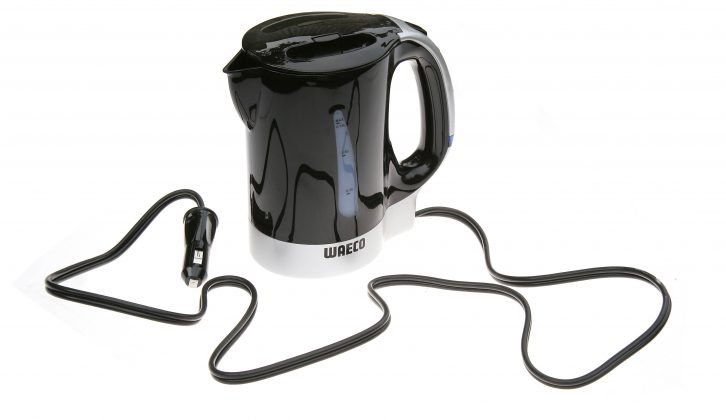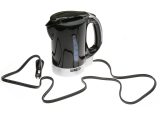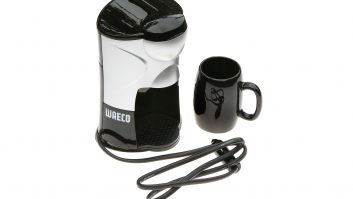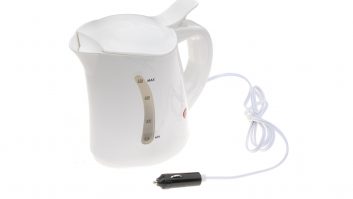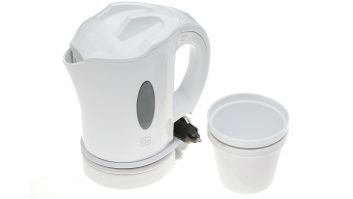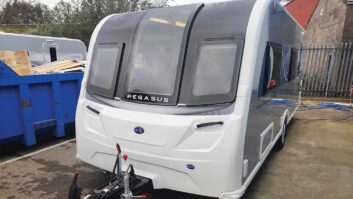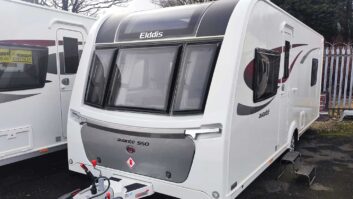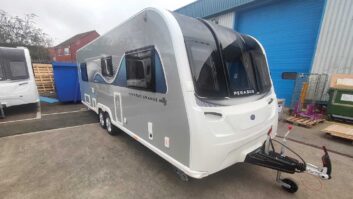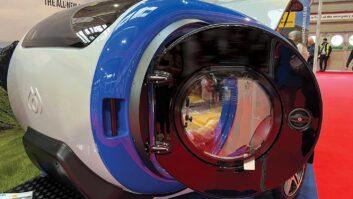Verdict
The Waeco Perfect Kitchen MCK750 12V kettle is not cheap, but it is a great product. No wonder it came out on top in Practical Caravan’s 12V kettle group test.
Pros
It has a useful, 750ml capacity
It has an auto switch-off function
It is well built and looks smart
Cons
It’s not cheap
With many of us owning a whistling kettle, and some of us also carrying a mains kettle – for campsites with decent mains hook-ups – you could certainly be forgiven for wondering why on earth anybody would also want a 12V kettle on their caravan holidays.
Well, just because your caravan has a stove and a traditional kettle doesn’t mean they’re always accessible when travelling. When on the road in your meticulously packed home from home, it can be hard to get to what you want, so there is a lot to be said for having a small kettle in the car for convenient drinks at stops.
And better still if the kettle automatically switches off once it’s boiled. That means it can be left to its own devices while you go off to refresh yourself, or stock up on goodies at the shop.
But there are further advantages. On a hot day, it can be handy to have a small device that keeps its heat output self contained. Unlike firing up a gas stove, running a 12V electric kettle isn’t going to raise your caravan’s inside temperature by several degrees. And, in cold conditions, while escaping steam will cause some condensation, it’s nothing like as problematic as the water vapour created when burning butane or propane on a stove. And what if your campsite doesn’t have electric hook-ups?
Obviously, 12V electric kettles are slower than their mains counterparts, and many of us worry about the amount of leisure battery power they sap. This means that speed and power requirements are crucial – so in the Practical Caravan 12V kettle test we look at how long it takes to boil a large mug (300ml) of water, and measure the battery capacity used.
What if the kettle’s packaging says it should only be used in power sockets capable of handling 20 amps (A), but most cigarette lighter-style sockets are usually rated up to only around 12A. Does this mean that 12V kettles can only be used in a handful of vehicles anyway? No.
The maximum current stated is only drawn by the kettle for a split second when it’s first switched on. Current draw then settles down to around 9-13A. The short duration of the initial surge is almost never long enough to cause fuses to blow.
Technically, drawing 13A from a 12A socket is overloading the socket, but the reality is that the kettle will almost certainly always work absolutely fine and not cause damage to your vehicle. The reason for this is that electrical sockets are wired up so that they still perform efficiently even at maximum loading. And in order to supply 12A, with minimal voltage losses due to high current flow in the wiring, the wiring has to be seriously beefed up. So the wiring feeding most 12-amp sockets is usually capable of safely – though not efficiently – handling 30-40A.
Fuses, like wiring, are far more forgiving than most people realise. Most will not blow instantly unless the current passing through them is at least twice the fuse’s rating. However, currents below the ‘pop’ level, but above the fuse’s actual rating, will cause heat build up that will eventually make the fuse fail. But the speed of this heat build up is very much dependent on the current running through the fuse. If it’s close to the ‘pop’ amount, that is almost twice the rated current, the heat build up will be rapid and the fuse will fail quickly. If it’s just over the rated amount, such as 13A through a 12A fuse, heat build up will be so slow that the current would have to flow for a long time before the fuse will fail.
Of course, safety should be paramount with electrics, so consult an auto electrician if you have doubts about running any electrical accessory from a 12V socket. This is especially important if the socket has been added to the vehicle after manufacture.
So that’s the technical bit, how did the Waeco Perfect Kitchen MCK750 fare in the Practical Caravan 12V kettle test?
Its £39 price tag – which was over twice the price of any other product in our group test – meant that this had to be a good kettle. We are pleased to report that it is, in all ways. The plastics are a cut above most kitchen appliances, but performance is where this kettle really excels. Our mug of boiling water took 14 minutes, and consumed a frugal 3.03Ah of battery power.
Best of all, it has auto switch-off. Other pleasing points are the 750ml capacity and the element-less design, which means smaller volumes of water can be boiled without causing damage. Perfect for reducing boil times. It also looks smart with its black and silver finish.
In fact, the Waeco Perfect Kitchen MCK750 was the winner in our group test, scoring a perfect five out of five. The Waeco Perfect Coffee MC01 also featured in this group test and scored a very respectable four out of five – and at £16 it is a lot cheaper than the Waeco Perfect Kitchen MCK750. At £20, the Halfords Go Car kettle might also be worth looking at – it also scored four out of five. The Summit Car/Truck Jug kettle GY-342 received a three-star score.
Best of all, it has auto switch-off
